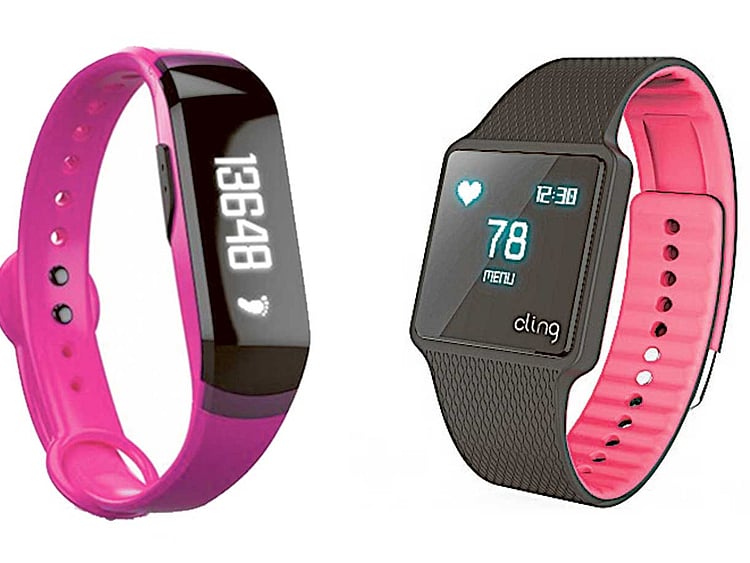Stay fit with Fitkat
Wearables company focuses on fitness, health, wellness and safety — all integrated into one device

Dubai
There is no shortage of fitness bands in the market today as many companies have forayed into this space and many more are expected to follow. It is a big business as consumers are becoming more health conscious.
As wearable devices like Fitbit and Jawbone Up track steps taken, calories burnt and number of hours slept, they only aim to improve health. All of the data are transmitted to the smartphone via an app.
The latest entrant is a device called FitKat, founded by Indian entrepreneur Chirag Jagtiani and Abhishek Madarasmi based in China.
It is not only a fitness tracker that helps gauge your activity levels and develop a disciplined health routine but also allows users to send out an SOS alert [to five third-party phones] in case they felt they needed help by pressing a dedicated button on the device.
“We are a wearables company focusing on four different verticals — fitness, health, wellness and safety — all integrated into one device,” Jagtiani said in an interview with Gulf News.
There are many bands available in the market, right from branded ones to OEMs based in China, so to differentiate from the crowd, he said that Fitkat came into existence.
The SOS alert feature is available in many phones, but he said that Fitkat kills around 12 seconds of the mobile phone when the user is in an emergency situation.
“Our wellness feature allows users to set water and pill reminders and they can get reminded on the smartband/smartwatch that it is time to drink water or to take the medicine. We have made it more interesting for users by introducing levels so that they can enjoy a gamification version of the app and doing their activity,” he said.
Fitkat is the first band in the market that monitors body temperature to detect dehydration. The “Guardian” feature allows friends and family [up to 5] to monitor the user if he/she has taken enough water or medication, or to motivate the user to do more.
Another band in the market — GOQii — also comes with a personal coach as well as a team of nutritionists and doctors who makes sense of the data and coaches the person to make changes in the lifestyle to make him/her healthy and active. Users can chat with their coach for expert advice and comments. The band is free but users have to pay a fee per year for the personal guidance.
“The idea behind the guardian feature is that users are more likely to heed advice from a friend or family member rather than someone unknown,” he said.
Fitkat comes in four variants — Ultimo smartband for $79.99, Pulse watch for $120, Edge watch in June for $99 and Ultimo Plus for $129.
The wearable wristband has an OLED display and works with iOS or Android devices. The company says that the band will have a battery life of 7-10 days on full charge.
Last year, the company sold 80,000 units and this year, it expects to sell between 180,000 and 200,000 units.
Research firm Gartner forecasts that 274.6 million wearable electronic devices will be sold worldwide in 2016, an increase of 18.4 per cent from 232 million units in 2015. Sales of wearable electronic devices will generate revenue of $28.7 billion in 2016. Of that, $11.5 billion will be from smartwatches.
Angela McIntyre, research director at Gartner, said that fitness wearables — which include wristbands, smart garments, chest straps, sports watches and other fitness monitors — continue to increase in popularity, driven in some part by wellness programmes.
Although the size of the worldwide wristband market was on a par with the unit sales of smartwatches in 2015, she said that looking forward, smartwatches will have stronger appeal with consumers as they typically have more multifunctional devices that can track exercise.
Jagtiani said that the countries they are aiming is like India where crime rates are very high, countries which focus on child safety, hospitals to remind about medicine intake and to keep an eye on the well-being of a wrinkly relative.
The US, Canada and the UK are the major markets for the company and they have just opened up in Singapore, India and Thailand.
“Many hospitals are buying our personalised products to push personalised messages to patients and we have signed a memorandum of understanding with Dubai Police for personalised child safety bands and Majid Al Futtaim for security purposes at their malls,” he said.
Wearables started as a trend and fashion but now people are “more cautious” about their health. They [people] are willing to pay for a good product and they want value out of the product. The more the companies, the more the value for buyers.
He said that the company’s business model is online only and is most likely to tie up with Souq.com for its sales in the UAE.
Sign up for the Daily Briefing
Get the latest news and updates straight to your inbox
Network Links
GN StoreDownload our app
© Al Nisr Publishing LLC 2026. All rights reserved.